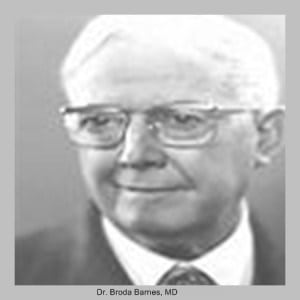Dr. Broda Barnes on Thyroid Health and the Basal Body Temperature Chart

Some researchers have identified molecules of thyroid hormone that are the mirror image of the active hormone. Compare the active hormone to a left-hand glove and the inactive hormone is like a right-hand glove. Only the left glove is useful, but the test counts the total number of gloves – both right and left. If you have a lot of right-hand gloves, the test will show that everything is normal when, in fact, it is not.
Broda Barnes, MD, was perhaps the first physician to come to the conclusion that many people suffering from chronic illness had underfunctioning thyroids. In his book, Hypothyroidism, the Unsuspected Illness (Broda Barnes and Lawrence Galton, Harper Collins Publishers, Inc., 1976), he stated that hidden hypothyroidism is responsible for many chronic health problems including heart disease, immune system problems and chronic fatigue. He also felt that laboratory tests don’t diagnose many cases of hypothyroidism.
Dr. Barnes developed a way to screen for hypothyroidism by taking a basal body temperature. Basal body temperature is taken the very first thing in the morning, before there is any movement or activity. The thyroid is the body’s thermostat, controlling metabolism. Body temperature is a reflection of that metabolic activity and people with underfunctioning thyroids tend to have low basal body temperatures. You can record your basal body temperature below; take it into your functional medicine practitioner so that he or she can interpret it for you (this is assuming they are basal body temperature-literate).
Barnes’ Recommendations
If the average temperature over three days is less than 97.8 degrees Fahrenheit then, according to Barnes, one may have hypothyroidism. When the temperature is consistently above 98.6 degrees Fahrenheit this is an indication that one may have hyperthyroidism.
Symptoms of Low Thyroid Function
- Low body temperature. You feel cold even when others do not.
- Fatigue, sometimes relentless
- Lack of motivation
- Loss of interest in sex
- Depression
- High cholesterol
- Sadness or crying for no reason. This can include women who have this symptom or experience mood swings at certain times during their menstrual cycle
- Inability to lose weight despite healthy diet and exercise
- Puffiness under the eyes
- Ankle swelling
- Frequent colds or allergies
Barnes stated in his book that hypothyroidism is very common for a variety of reasons. Iodine deficiency is common, especially in the world’s “goiter belts,” or areas that are removed from the seashore (like the American Midwest). Barnes said the addition of iodine to sale is not enough to bring hypothyroidism under control. Other nutrients, like vitamin B12, vitamin A, and tyrosine are also necessary for proper thyroid function. Chemical pollution, fluoride, chlorine and heavy metal toxicity can also adversely affect the thyroid. This is one of the reasons why dealing with liver function and improving the body’s ability to remove toxins is so important. Nitrites added to packaged meats, certain sulfa drugs given to farm animals and even certain soft plastics used to hold drinks could be a source of chemicals that harm the thyroid. Poor digestion, especially poor protein digestion may also be a source of this problem. Barnes recommended the use of natural thyroid extract (also called desiccated thyroid hormone, such as Armour, Nature-throid, NP Thyroid or WP-Thyroid. He preferred the natural product to the usually prescribed synthetic hormone (Synthroid) because natural desiccated thyroid hormone is a whole product and contains all of the components of thyroid hormone. Some patients can improve thyroid function with nutrient supplementation, exercise, dietary changes, and by addressing some of the other core health issues.
SIDENOTE: Never attempt to use iodine supplementation without the support of an iodine-literate physician. I have failed miserably 4 times attempting iodine. It isn’t as simple as you might think. As a resource only (I do not advocate for iodine supplement in Hashimoto’s) and to learn if iodine is right for you, review the iodine protocol at BreastCancerChoices.org.
Download my free Basal Body Temperature Chart also available via the Hashi’s Sister’s Holistic Autoimmune & Thyroid e-Course:
Basal Body Temperature Tracking


